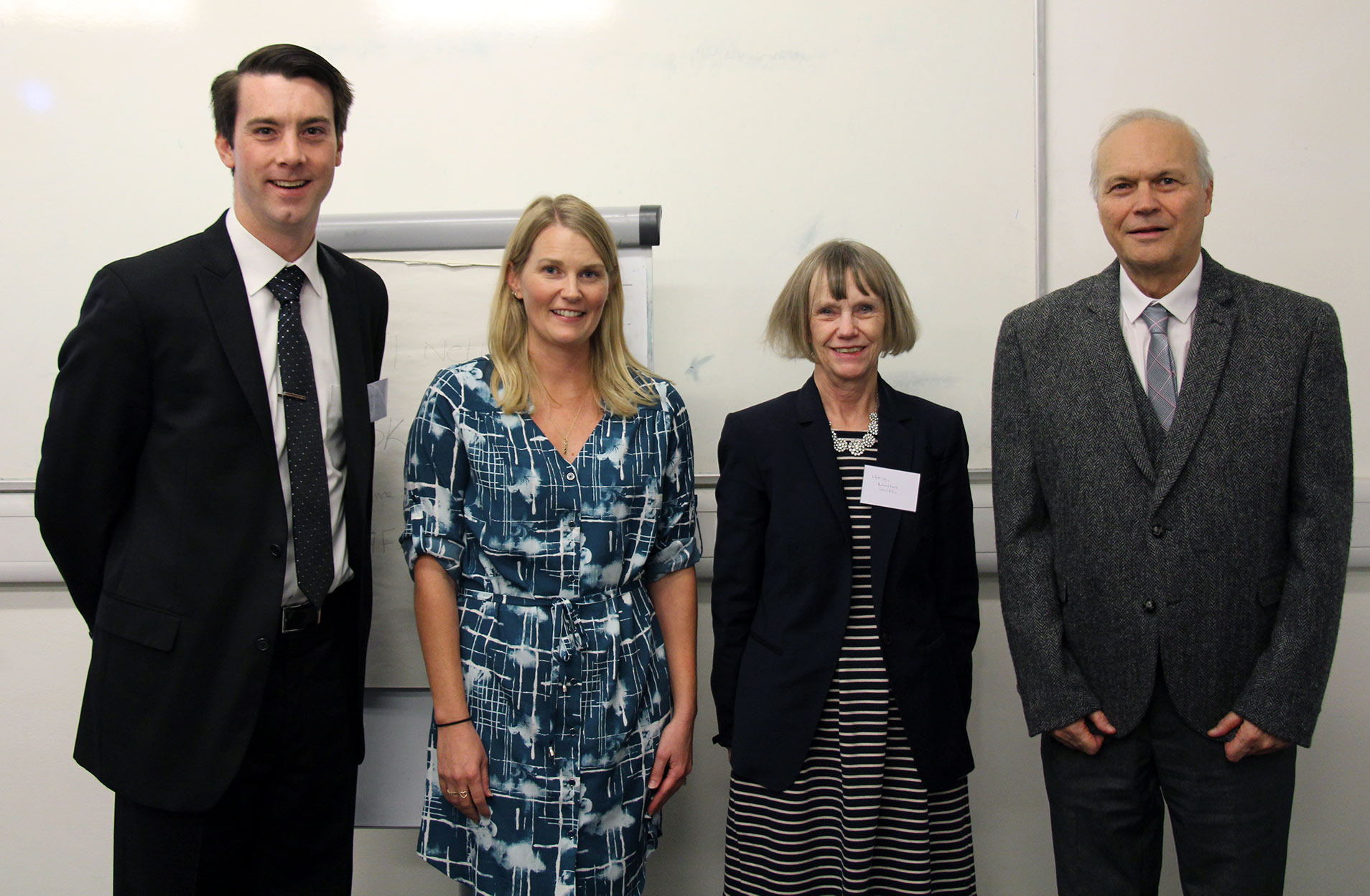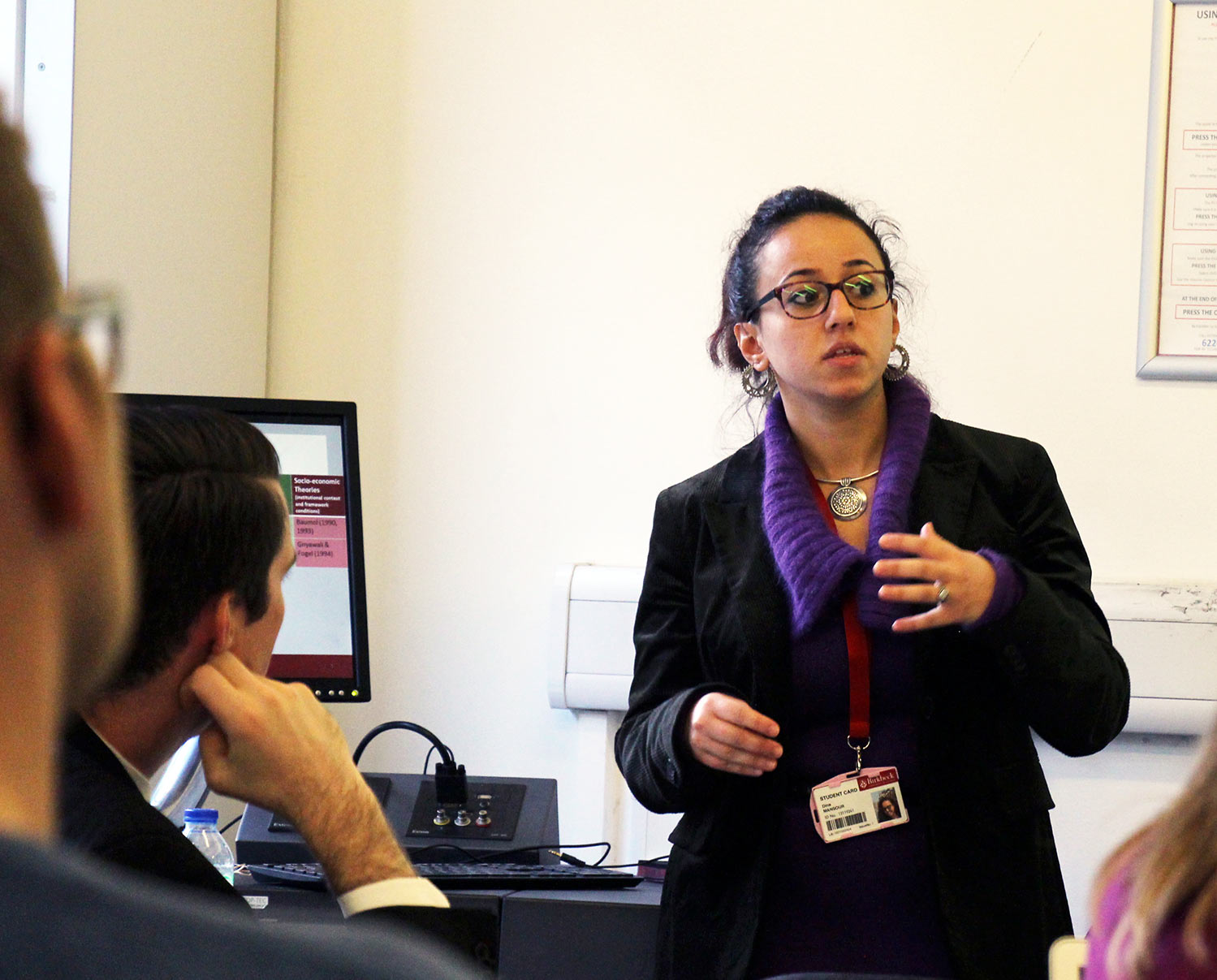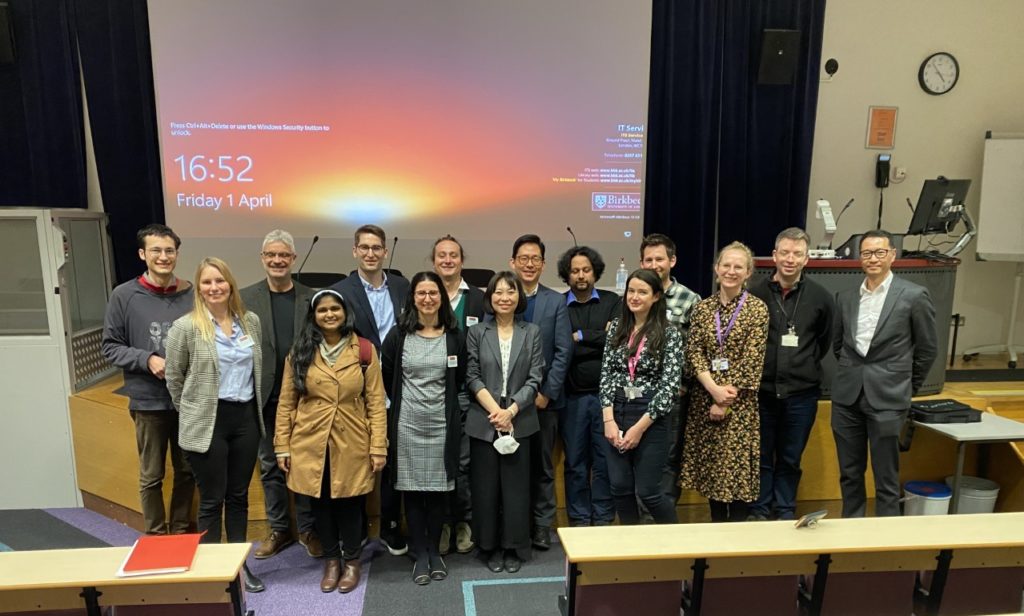A recent workshop from Birkbeck’s Centre for Innovation Management Research and publisher Wiley saw debate about the new directions that research in entrepreneurship and innovation could take, including the potential future role of Artificial Intelligence.

On Monday 29 October, Birkbeck’s Centre for Innovation Management Research (CIMR) hosted a research workshop in collaboration with Wiley, publishers of the Strategic Change: Briefings in Entrepreneurial Finance Journal. Professor Helen Lawton Smith and Professor Carlo Milana in the Department of Management are editors of the journal.
The aim of the workshop was to stimulate debate on new directions in research in entrepreneurship and innovation, in order to encourage new submissions, reach wider audiences, and highlight opportunities for more dynamic research contributions in the field. The workshop also provided an opportunity for current Management PhD students to discuss their research and progress with the audience, demonstrating the Centre’s diverse and unique research expertise.
Future Directions and Artificial Intelligence Research
Professor Carlo Milana opened the workshop with a discussion of the journal’s “business model” – a thematic approach whereby each issue deals with a particular topic, encouraging a variety of submissions that provide different perspectives on key issues in entrepreneurial finance, sustainable business models, and emerging economies, among other areas of innovation management and entrepreneurship. He also expressed his interest in contributions that will address important questions around the future development of artificial and social intelligence; for example, how will artificial intelligence (AI) engage and impact entrepreneurship? Professor Milana concluded his presentation with a list of practical issues with AI, such as technological unemployment, jobs displacement, security and privacy, and the reliability of automated systems.
Continuing with the theme of artificial intelligence in business and management, Professor Damir Tokic (International University of Monaco) joined the workshop via Skype to discuss his research on the implications of AI for executive decision-makers, asking whether AI can replace human discretion. The world’s largest investment management firm, BlackRock, recently announced the launch of the BlackRock Lab for Artificial Intelligence, suggesting that it intends to “keep tapping into artificial intelligence” to improve the financial wellbeing of its clients. Thus, Professor Tokic asks in his research: “Can AI replace the human discretion in investing?”
The answer is yes, technically, because AI programmes can use econometric methods to extrapolate historical data and can interpret and use economic forecasts embedded in financial assets, ultimately ensuring market efficiency. However, legislation, unpredictable geopolitics, and the justice system might prevent the rise of “Robo decision-makers”, meaning that while machines can be fed with all possible human knowledge and available data, as long as human imperfections are preserved, AI-powered machines will not be able to replace human discretion.

Birkbeck PhD candidate Dina Mansour
Open Research, Transparency and Relevance
When we talk about research in the current academic environment, the topic of impact inevitably comes up. In his presentation, Chris Graf, Director of Research Integrity at Wiley, asked what it means for research to be “open”, saying that open science/access is a way of doing research that brings about new opportunities for publishers by: (1) driving forward new models of publishing to emphasise relevance, (2) creating new services for researchers to support their requirements through innovation, and (3) taking a thought leadership position through community engagement. He also discussed issues of reproducibility in research and publication bias, whereby reviewers and editors may be more inclined to accept manuscripts based on the direction of findings, potentially neglecting lesser known research and making some studies seem more significant than they are. His recommendation was to increase the transparency of the research process and products to improve research reproducibility.
Research on Gender and Entrepreneurship
Professor Colette Henry (Dundalk Institute of Technology) provided greater insight into the nature of research on gender and entrepreneurship, noting that in the entrepreneurship literature, “gender typically means ‘women’s entrepreneurship’”, and there is urgent need for new perspectives on the topic, such as: (re-)conceptualising the gender perspective in entrepreneurship, the influence of gender on the entrepreneurial ecosystem, leadership styles, and business model innovation.
She also shared data on women’s participation in entrepreneurship, highlighting that more women are engaged in ‘necessity entrepreneurship’ than opportunity-based entrepreneurship. This means that women across the world are more likely to become entrepreneurs due to gender-specific issues, such as childcare challenges and restrictive workplace policies; and in some cases, some women simply become entrepreneurs to meet basic economic survival needs as they have no other options.
A Publisher’s Perspective: Maximising Research Impact
After a full day of discussing future areas of research in entrepreneurship and innovation, it was only appropriate to end with the publisher’s perspective on how to maximise the reach and impact of publications. Shannon Canney, Senior Editor at Wiley, began by asking the audience which metrics mattered to them. For most people, the answer was citations, which was consistent with Wiley’s research findings: most people think citations are highly important, whereas some think downloads come next, and a smaller percentage believe social media sharing matters.
Joshua Tufts, Editor at Wiley, said that all these metrics matter for research impact, as they contribute to a comprehensive view of a paper’s performance. It is important for researchers to use various channels to publicise their research because search engine optimisation (SEO) is vital in a digital age, and between June 2016 and July 2017, 54% of visits to Wiley Online Library came from search engines (26% had no referrers, 18% came from other websites, and 1% came from social media). Academics and researchers can maximise their impact through SEO in 4 easy steps, including: usage of relevant key words/phrases throughout the article, choosing a smart, descriptive title which incorporates key phrases, writing a good abstract by expressing key points from the article in simple terms, and creating a network of inbound links and citations to one’s article.
Wiley provides a useful self-promotional author toolkit that researchers can utilise to help ensure their work is seen, read, and cited.
It was a very insightful event for researchers in entrepreneurship and innovation, and the organisers would like to give particular thanks to the sponsors, Wiley, and all speakers:
- Shannon Canney, Senior Editor, Wiley
- Chris Graf, Director, Research Integrity & Publishing Ethics, Wiley
- Colette Henry, Adjunct Professor of Entrepreneurship, Dundalk Institute of Technology
- Carlo Milana, Editor in Chief, Strategic Change: Briefings in Entrepreneurial Finance
- Damir Tokic, Professor of Finance, International University of Monaco
- Joshua Tufts, Editor, Wiley
Birkbeck PhD Students
- Maryam Ghorbankhani – Exploitation of Public Sector R&D
- Maximillian Giehrl – Open Innovation Collaborations in German Manufacturing Firms
- Dina Mansour – Entrepreneurship and Economic Development in Developing Countries: The Case of Egypt
- Peter Ross – Theories of Diffusion of Innovation and Medical Engagement: Successful Adoption and Assimilation of Healthcare Reform
Presentations from the workshop can be downloaded from the CIMR website.



